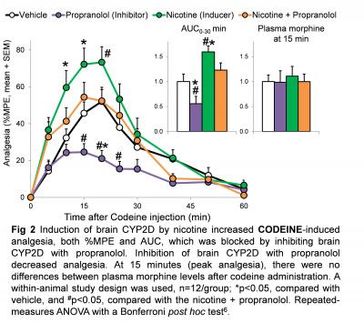Small changes in DNA can affect nicotine consumption
Advertisement
nicotine is an addictive substance and genetic factors are known to play a role in smoking behaviors. Recently, a team of researchers at Penn State and the University of Colorado determined how small differences in a particular region of the mouse genome can alter nicotine consumption.
Nicotine binds to and activates specific receptors on nerve cells in the brain that can also bind the neurotransmitter acetylcholine. These receptors are made up of five subunits, and human genetic studies show that changes in a single subunit can alter nicotine behavior. The researchers focused on the gene that encodes the beta-3 subunit, which is found in areas of the brain important in drug behavior.
"We know that genes influence nicotine behaviors, but trying to figure out what specific genetic variants do requires different types of tools," said Helen Kamens, assistant professor of biobehavioral health, Penn State. "This work was based on associations that were found in human genetic studies. Genetic variants were shown to affect certain nicotine behaviors, but the question was why? Here we focused on trying to figure out what these genetic variants actually do."
According to Kamens, in humans, two naturally occurring variants in the area of the genome that initiates expression of genes linked to nicotine use have been identified. People carrying the more common version of the beta-3 subunit of nicotinic acetylcholine receptors -- the major allele -- are more likely to have problems with nicotine use. People with the less common version -- the minor allele -- are protected against nicotine dependence. The minor allele differs from the major allele in having three differences in the DNA sequence in the area involved in turning on nicotine-related genes. Previous work also shows that expression of the minor allele results in less of the beta-3 protein being made.
The researchers used a mouse model to study how reducing how much of the beta-3 subunit was made, or preventing its production completely, affected nicotine consumption. They used genetic engineering techniques to remove one or both copies of the beta-3 gene. Then, to measure how much the mice wanted the drug, the researchers provided each mouse with two water bottles, one with nicotine and one without nicotine, and recorded how much water the mice drank from each bottle. Mice lacking one or both copies of the gene encoding the beta-3 subunit consumed less nicotine than normal mice. The researchers performed these tests using two different strains of mice, but the lower consumption of nicotine was only seen in one of the strains, indicating that other genetic factors also play a role in nicotine cravings.
Finally, by individually reversing each of the three genetic differences in the minor allele in mouse cells in culture, the researchers found that only one of the three differences reduced the amount of beta-3 protein the cells produced.
"All three of these single nucleotide changes are inherited together, so in a human population, you get a sequence where all three nucleotides are either major or minor," said Kamens. "Using a cell culture system, we were able to disentangle which of the nucleotide changes actually has an effect on protein amounts, which is something we could never see in a human population."
Future work by the researchers will focus on measuring other behaviors that better reflect differences in nicotine addiction to further prove the importance of the beta-3 subunit of nicotinic acetylcholine receptors as well as how changing the DNA in a single location actually reduces expression of the beta-3 gene.






















































